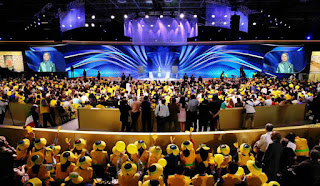This is a good article worth reading.
By Jubin Katiraie
On May 19, the Islamic Republic of Iran held hotly anticipated elections for the presidency and a number of local offices. Particularly optimistic international observers viewed it as another possible jumping-off point for internal moderation of the Iranian regime. Meanwhile, staunch critics of that regime viewed the elections as inconsequential, with the banned opposition group the People’s Mojahedin Organization of Iran (PMOI or MEK) even organizing a boycott of the polls in order to call attention to the absence of an actual reformist voice on the national stage.
A month after the elections in which so-called moderate incumbent Hassan Rouhani retained his seat, the concerns of the critics have been validated while the hopes of the optimists have been dispelled. Iran is clearly not on any path toward moderation. Instead, all of its familiar abusive, violent, and provocative policies and behaviors are continuing unabated, or even being amplified.
Domestically, dissidents, activists, journalists, and social progressive all remain targets of an extensive crackdown and program of political imprisonment. Various arrests took place in the run up to the elections, notably those of administrators of local user groups for the popular Telegram instant messaging app. The interrogation and planned prosecution of such figures is proceeding as planned, and even the most pro-reform voices in the nation’s government have done nothing of substance to challenge repressive institutions like the Iranian Revolutionary Guards Corps.
Immediately after winning reelection, Rouhani distanced himself from his campaign promises, saying that the fate of the political prisoners would largely be in the hands of the hardline judiciary and the Intelligence Ministry.
The regime lives in fear of an uprising calling for its overthrow, much like the one that erupted following the 2009 sham election, and it is ridiculous to suppose that a dyed-in-the-wool regime insider like Hassan Rouhani would lead the way to moderation, especially given the severe limits on his authority within the theocratic dictatorship.
In any event, it is certainly the case that the trend of popular opposition to the Iranian regime has only grown in the eight years since the 2009 uprising, even though it has largely been forced underground. But on July 1, the National Council of Resistance of Iran, with the PMOI at its head, will hold its annual Iran Freedom rally in Paris, bringing together an expected 100,000 Iranian expatriates from throughout the world and broadcasting the event to illegal satellite dishes in millions of households inside the Islamic Republic.
The Iranian people are eager to hear the message of regime change. The international community should be equally eager to hear the same message. And more than that it should be willing to stand up in support of the Iranian Resistance, endorse its message, and pursue foreign policies that are in line with the goal or toppling the theocracy and encouraging a self-built democratic system in the nation of Iran.
This is especially the case in the wake of the past four years of false moderation under Rouhani, and especially in the wake of the past month during which the same progressive-sounding promises have been broken all over again. It is time for all freedom-loving countries of the world to formally recognize that internal moderation of the Iranian regime is not a realistic possibility, and that meaningful change must be forced upon the government by the Iranian people, with the help of their international allies.
The NCRI’s gathering on July 1 will be an opportunity to drive this message home, and that effort will be supported by hundreds of American and European politicians, academics, and other people who are in a position to affect change in the foreign affairs of their own countries. Those supporters already understand what the world ought to know: that there is a viable alternative waiting in the wings to take the place of the irredeemable Iranian regime. And more than just waiting, the NCRI is making itself known on the international stage so that democratic governments can begin to collaborate on a strategy that will give a stronger voice to the Iranian people and bring an end to the Islamic theocracy once and for all.




Comments
Post a Comment